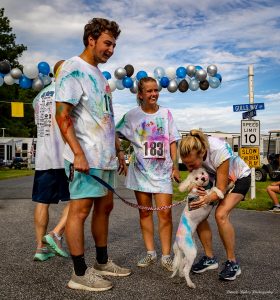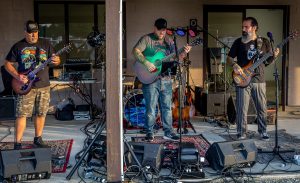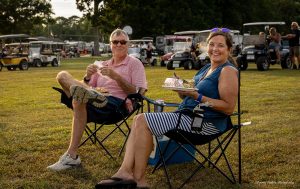On a Friday night at Gulls Way Campground in Dagsboro, Delaware, the Dustin Showers Band played as campers enjoyed dinner. The next morning, they doused 5K runners in bright powdered hues, ate chicken barbecue platters courtesy of the local fire company, raffled homemade baskets, and bid on items in a live auction. There was even a cornhole tournament.

“I’m proud to say that my grandson won first place,” says Kim Cropper, wife of the late JR Cropper. “And he donated the money he won back to our event.”
JR’s grandparents opened the campground in the early 1980s, and the entire Cropper family now plays a part in operating Gulls Way.
Together, the Cropper family and the Gulls Way community created the two-day JR Cropper ALS Memorial Benefit to honor Kim Cropper’s husband, Elisha Wayne Cropper Jr., “JR.” JR suffered from amyotrophic lateral sclerosis (ALS) — also known as Lou Gehrig’s disease, a fatal motor neuron disease characterized by progressive degeneration of nerve cells in the spinal cord and brain — and died in February 2021. ALS is one of the most devastating of the diseases that affects the function of nerve cells responsible for muscle movement.
“We didn’t know anybody with ALS,” Cropper says. “Once he passed away, I wanted to bring some awareness. So we decided as a family — here at Gulls Way, the Croppers, and all the workers here — that we needed to bring attention to this disease to see if we could get some funding and more research to hopefully find a cure and medicines that will extend people’s lives.”
This year’s benefit raised nearly $80,000 for the Robert Packard Center for ALS Research at Johns Hopkins. The money will help to fund one research grant through the Packard Center’s grant program.

While funding through the National Institutes of Health (NIH) can take up to three years and requires extensive preliminary research and writing, the Packard Center’s grant model relies on recommendations from an advisory panel of researchers, clinicians, clinician scientists, and basic scientists, allowing for short proposals and quick funding time.
“By the time you actually write a grant to NIH, it’s got to be work that’s mostly done. And if you really want to jumpstart new ideas and especially bring new people in, you’ve got to have pump-priming dollars, startup dollars, to get a project moving forward,” explains Jeffrey D. Rothstein, MD, PhD, founder and director of the Robert Packard Center for ALS Research. “That is what a Packard Center grant can provide.”
Rothstein is also the John W. Griffin Director of Pedersen Brain Science Institute, professor of Neurology and Neuroscience, and medical director of the Johns Hopkins MDA ALS Clinic.
All grant money is philanthropically raised with support from an advisory board made up of members “who see the value in collaborative work ethic,” Rothstein says. In the 22 years since its founding, the center has raised roughly $150 million to fund research.
The grants range from $50,000 to $100,000 per year and bring together junior and senior researchers, allowing for collaboration opportunities and access to new science. “We built on [the] social culture of science to make it successful,” says Rothstein. “And it’s worked out really quite well.”
In one instance, a $50,000 grant funded a study exploring drugs for ALS that uncovered a class of antibiotics called cephalosporins, which performed well in an ALS-relevant model. That initial study led to a 1,500-patient national clinical trial funded at $20 million by the NIH, the largest-ever academic trial in ALS. While the trial ultimately was unsuccessful, it would not have happened at all without the preliminary funding.

“So it can mean the world of difference to have support from a Packard Center grant,” Rothstein says.
The Cropper family and the Gulls Way community are proud to fund research into the novel therapies and treatments they longed for as her husband’s disease progressed.
“We are really excited to have our own little group that’s going to be doing research on the money that we raised,” she says. “And we’re hoping that something comes out of it, some kind of new medicine or just something positive. We are glad that we are putting our money towards this.”
The Croppers plan to make the benefit an annual event. And though it’s tough work — fitting as she says JR was best described as a hard worker — Cropper knows she can lean on local businesses and the Gulls Way community to make the event a success.
“I couldn’t be more appreciative for all our people in this area,” she says. “Everybody looks forward to it. They have fun while donating to a good cause. And the energy is continuing to grow.”
Topics: Friends of Johns Hopkins Medicine, Johns Hopkins Medicine, Neurology, Fuel Discovery